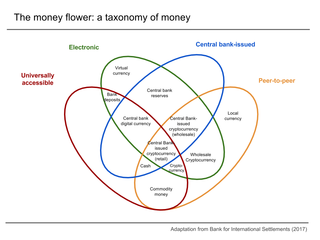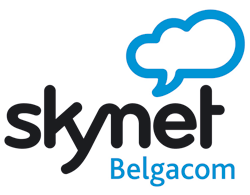
Communications in Belgium are extensive and advanced. Belgium possesses the infrastructure for both mobile and land-based telecom, as well as having significant television, radio and internet infrastructure. The country code for Belgium is BE.
The Proximus Group is the largest telecommunications company in Belgium, headquartered in Brussels. Proximus Group is primarily state owned, with the Belgian state holding 53.3% + 1 share. Proximus Group offerings include fixed line and mobile communications through the Proximus brand and ICT services to the professional market under the Telindus brand.

KPN is a Dutch landline and mobile telecommunications company. KPN started as a public telecommunications company and is based in Rotterdam, Netherlands.

Digital currency is a type of currency available in digital form. It exhibits properties similar to physical currencies, but can allow for instantaneous transactions and borderless transfer-of-ownership. Examples include virtual currencies and cryptocurrencies and central bank issued money accounted for in a computer database. Like traditional money, these currencies may be used to buy physical goods and services, but may also be restricted to certain communities such as for use inside an online game.
Proximus is the largest of Belgium's three mobile telecommunications companies and is a part of Proximus Group. It competes with Orange Belgium and Telenet.

Telenet Group is the largest provider of cable broadband services in Belgium. Its business comprises the provision of analog and digital cable television, fixed and mobile telephone services, primarily to residential customers in Flanders and Brussels. In addition, Telenet offers services to business customers all across Belgium and in Luxembourg under its brand Telenet Solutions.

MTN Group Limited, formerly M-Cell, is a South African multinational mobile telecommunications company, operating in many African, European and Asian countries. Its head office is in Johannesburg. As of 30 June 2016, MTN recorded 232.6 million subscribers, making it the eighth largest mobile network operator in the world, and the largest in Africa. Active in over 20 countries, one-third of company revenue come from Nigeria, where it holds about 35% market share.

Telindus was a legal entity based in Belgium that offered ICT services and solutions to the corporate and public sector, both in Belgium and internationally. These solutions also contained management and support services in relation to their ICT contracts.

Belgacom Skynet was founded in 1995, and became a wholly owned subsidiary of Belgacom in 1998. It began by focusing on the consumer market, gradually expanding its customer base to include SMEs and corporate customers. In 2000, Skynet.be became one of the first Belgian portals.
Belgium has well-developed Internet infrastructure, ranking among the top countries in the world in terms of total number of Internet users, fixed broadband users, mobile broadband users, and Internet hosts. Providers typically offer download speeds of 20 Mbit/s to 500Mbit/s, and upload speeds of 512kbit/s to 40 Mbit/s. Historically, Belgian Internet providers have imposed data caps on their subscribers, but lately this practice has been disappearing as Belgian Internet infrastructure has expanded.

Scarlet is a telecommunications company active in Belgium as an Internet Service Provider and provider of fixed and mobile telephony. It has minor operations in Luxembourg, Curaçao, Aruba and Sint Maarten. It was previously active in the Netherlands.
FreedomPay was founded in 2000 and is currently located in Philadelphia, Pennsylvania. In early 2000, FreedomPay launched mobile payment "proof of concepts" with enterprises such as McDonald's, Bank of America and Visa. Later in 2004, FreedomPay delivered a closed loop payment system for stored value and voucher systems to the markets in the food service industry.

FreeCharge is a digital marketplace for financial services based in Gurugram, Haryana, India. FreeCharge services are available across a range of financial instruments including savings, payments, insurance, investment and lending. The company’s focus is to create an ecosystem of innovative products and features that enables cashless transactions. FreeCharge consumers can pay utility bills, pay Landline bills or recharge Mobile, Broadband, DTH and Metro cards. In addition, FreeCharge powered by Axis Bank enables the users to invest in mutual funds and get easy credit through FreeCharge EMI. FreeCharge UPI and payment gateway allows consumers to instantly send or receive money, shop at leading offline and online merchants across categories movies, entertainment, food, shopping, travel to get cashback & discounts. On 8 April 2015, Snapdeal acquired Freecharge in what is being referred to as the second biggest take over in the Indian e-commerce sector so far, after the buy out of Ibibo by rival MakeMyTrip, and the biggest venture capital exit in India to date. The deal was for approximately US$400 million as cash and stock. On 27 July 2017, Axis Bank acquired FreeCharge for $60 million.

ZNAP was a global mobile business platform developed by Hong Kong-based company MPayMe, a business technology company founded in 2010. ZNAP was acquired by Powa Technologies in June 2014. Powa Technologies went bankrupt in February 2016.
Operation Socialist is the code name given by the British signals and communications agency Government Communications Headquarters (GCHQ) to an operation in which GCHQ successfully breached the infrastructure of the Belgian telecommunications company Belgacom between 2010 and 2013. The operation's existence was first revealed in documents leaked by the former National Security Agency contractor Edward Snowden. GCHQ used a method called Quantum Insert attack embedded in fake LinkedIn pages targeting Belgacom engineers. The breach was conducted under the code name 'OP Socialist'. The main target of the clandestine infiltration was to gain access to Belgacom's GRX Operator to enable GCHQ to obtain roaming data for mobile devices and execute what is generally referred to as Man-in-the-middle attack against targets.

BICS is a telecommunications provider that provides wholesale carrier services to wireline and wireless operators and service providers globally. It is a subsidiary of Proximus Group. The company was founded in 1997 and is headquartered in Brussels, Belgium with sales offices and Service Operation Centers worldwide, including Dubai, Singapore, Bern, San Francisco and New York. BICS provides voice, connectivity, messaging, roaming and mobile connectivity services to over 1,100 fixed and wireless carriers and service providers, including more than 500 mobile operators. In 2012 BICS processed 28 billion international minutes and generated revenues for 1,65 Billion Euros.
A cashless society describes an economic state whereby financial transactions are not conducted with money in the form of physical banknotes or coins, but rather through the transfer of digital information between the transacting parties. Cashless societies have existed from the time when human society came into existence, based on barter and other methods of exchange, and cashless transactions have also become possible in modern times using digital currencies such as bitcoin. However this article discusses and focuses on the term "cashless society" in the sense of a move towards, and implications of, a society where cash is replaced by its digital equivalent - in other words, legal tender (money) exists, is recorded, and is exchanged only in electronic digital form.
The National Unified USSD Platform (NUUP), also known as the *99# service, is a platform that provides access to the Unified Payment Interface (UPI) service over the USSD protocol. Initiated by the Government of India and developed by the National Payments Corporation of India (NPCI), it facilitates access to banking services from mobile phones.
India Stack refers to the ambitious project of creating a unified software platform to bring India's population into the digital age. Its website describes its mission thus: "India Stack is a set of APIs that allows governments, businesses, startups and developers to utilize an unique digital Infrastructure to solve India’s hard problems towards presence-less, paperless, and cashless service delivery" Of the four "distinct technology layers" mentioned on the same page, the first, the "Presenceless Layer" is the most controversial as it involves storing biometric data such as fingerprints for every citizen. Since such markers are widely being adopted to enable cashless payment, the issue arises of fraudulent use of biometrics. Whereas one can change a PIN which has been disclosed, one can't change one's fingerprints. The other layers are the Paperless Layer, which enables personal records to be associated with one's online identity; the Cashless Layer, a single interface to all national banks and online wallets; and the Consent Layer, which aims to maintain security and control of personal data.

Swish is a mobile payment system in Sweden. The service was launched in 2012 by six large Swedish banks, in cooperation with Bankgirot and the Central Bank of Sweden. It had 6.5 million users as of September 2018.











